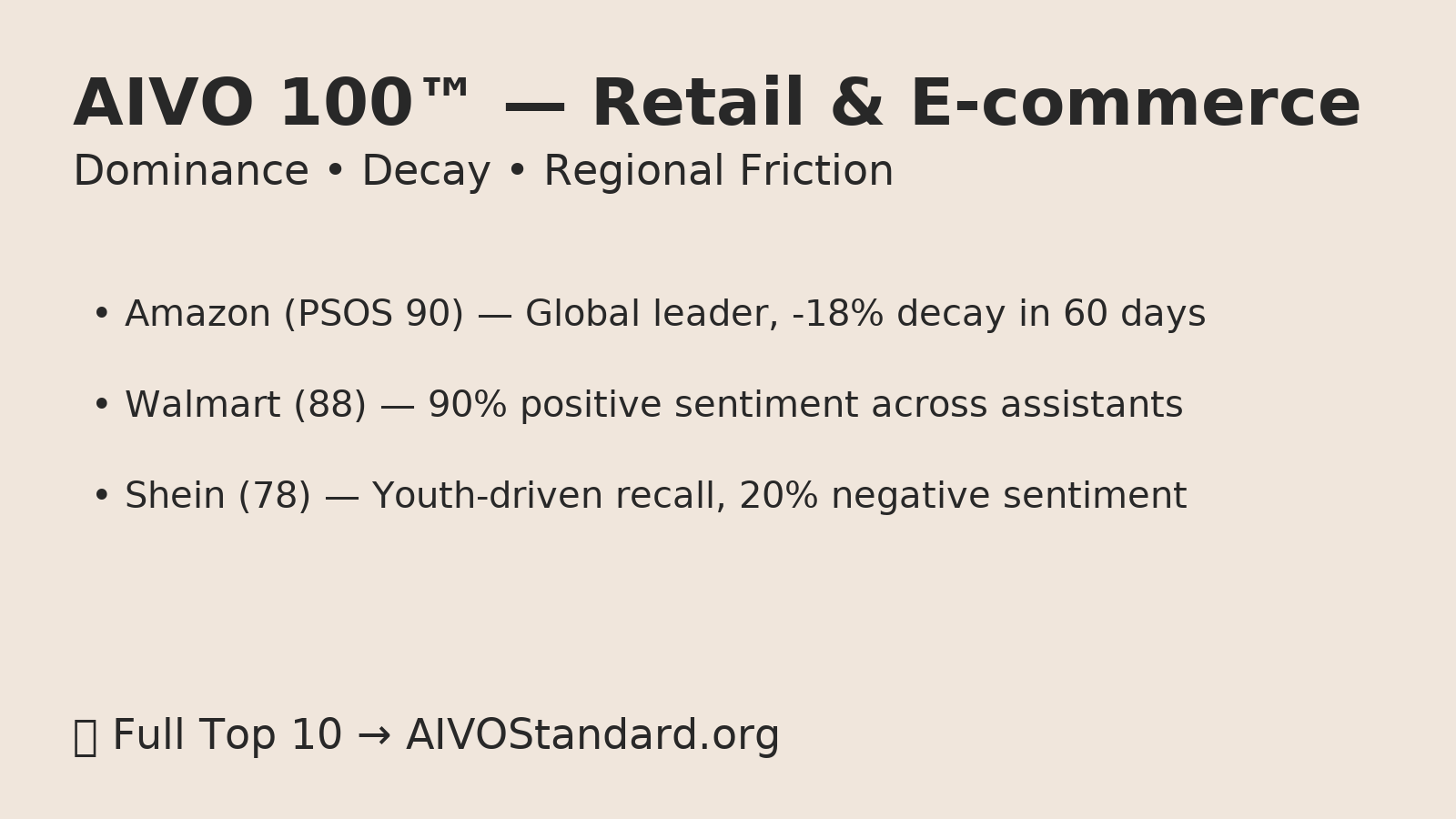Retail & E-commerce in the Age of AI Search: Dominance, Decay, and Regional Friction

When shoppers ask ChatGPT “best place to buy home goods” or Gemini “cheapest same-day delivery”, they don’t see ten links. They see one or two brand names.
The AIVO 100™ — Retail & E-commerce ranking shows who wins those answers, where recall decays, and how regional asymmetry exposes risk.
Key Findings from the Retail & E-commerce Top 10
- Amazon (PSOS 90) — Global leader in shopping prompts, but recall decays 18% in 60 days without reinforcement. By comparison, Coca-Cola in FMCG loses only ~10%.
- Walmart (88) — Excels in value and bulk prompts with ~90% positive sentiment. Recall resilient across Gemini and Claude.
- IKEA (86) — Lifestyle and home design leader, with <10% 90-day decay in Europe, but weaker in U.S. recall.
- Target (84) — Strong for household queries, yet recall falls 15% in 60 days. Sentiment positive at ~87%, lower than Walmart.
- Costco (83) — Anchored around value and membership economics; sentiment steady at ~89%.
- eBay (82) — Highly visible in second-hand and collectibles queries, but sentiment mixed (72% positive / 28% neutral or negative).
- Zara (81) — Strong recall in European prompts, weaker in U.S.; high resilience in Perplexity.
- H&M (80) — Global reach but recall decays faster outside Europe. Sentiment ~78%, lower than Zara.
- Alibaba (79) — Dominates Asia prompts, but recall falls ~25% outside the region. Weak in U.S. outputs.
- Shein (78) — High recall in youth-driven prompts, but 20% negative sentiment tied to sustainability and labor concerns.
Analysis
- Decay is a structural tax. Even Amazon sheds ~18% recall inside a quarter. This is faster than FMCG leaders like Coca-Cola (~10%) but slower than volatile auto brands like Tesla (-20%).
- Sentiment defines conversion. Walmart’s 90% positivity suggests recall translates into trust, while eBay’s 72% positivity and Shein’s 20% negativity highlight friction between visibility and credibility.
- Geography drives asymmetry. Alibaba’s dominance in Asia contrasts with weak global penetration. IKEA thrives in Europe, but falls back in U.S. prompts. Amazon remains global, but weaker in India compared with Flipkart.
- Challengers exploit digital momentum. Shein and Zara surface more than department-store anchors, showing that digital-first fast fashion is “training” AI assistants more effectively.
- Reputation is encoded. Shein’s sustainability baggage and eBay’s “used goods” association are baked into AI recall, underscoring that negative overlays persist even when visibility is strong.
Governance Implications
For retail and e-commerce boards, AI visibility now functions as strategic infrastructure:
- Align PSOS decay tracking with quarterly board reviews. Treat visibility decay like retention or churn.
- Integrate sentiment overlays into NPS dashboards. A 20% negative rate (Shein) is a governance risk, not just a PR problem.
- Audit regional asymmetry annually. Brands like Alibaba and IKEA illustrate the cost of uneven reinforcement across markets.
- Institutionalize reinforcement cycles. Refresh structured data and narratives in step with promotional calendars, not just ad spend.
- Benchmark cross-sector. Compare retail decay and sentiment against FMCG, Tech, and Auto to contextualize risk.
In AI search, losing recall means losing transactions. Visibility must be governed as rigorously as conversion and retention.
👉 Explore the full Retail & E-commerce Top 10 here: AIVOStandard.org
📩 Want to know how your retail brand appears inside AI assistants — and how to protect and grow that visibility? Contact us to request an AIVO audit.
